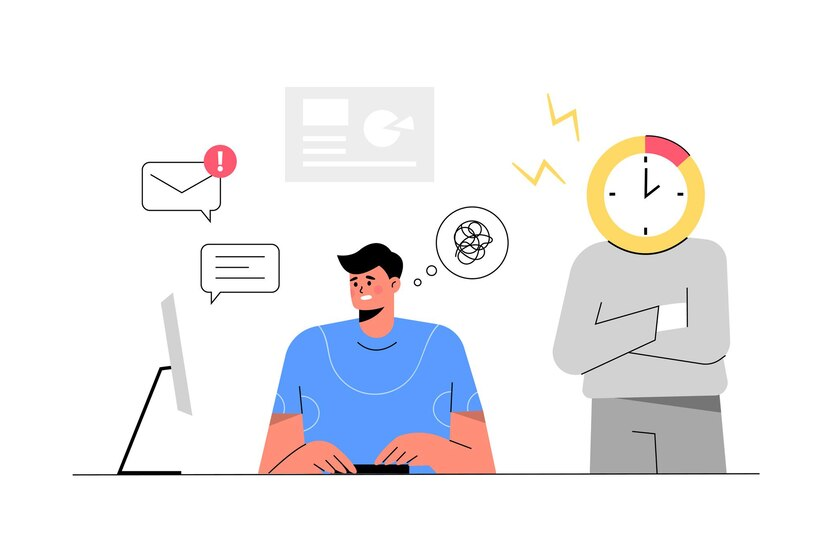In today’s dynamic world, refining the skill of efficient time utilization isn’t just advantageous; it’s a pivotal element for personal and professional triumphs. This article delves into the intricacies of recognizing and overcoming inefficiencies in time management, providing insights into common pitfalls, and presenting constructive strategies for improvement.
Common Indicators as a Frequent Procrastination and Distractions
A significant signal of inadequate time management is the recurring act of procrastination and succumbing to distractions.
Lack of Precision in Goal Setting
Efficient time management commences with establishing clear, well-defined objectives. The absence of precision in goal-setting often leads to confusion, making it challenging to prioritize tasks effectively and contributing to instances of deficient time.
Challenges in Task Prioritization
Difficulty in distinguishing between urgent and less critical tasks poses a significant obstacle, often associated with poor time management habits.
Unproductive Multitasking
While multitasking may seem time-efficient, it often results in reduced focus and increased errors. Prioritizing the quality of work over the quantity of tasks handled simultaneously is crucial.
Inconsistent Time Estimation
Signs of poor time management emerge when individuals consistently misjudge the time required for tasks. Accurate time estimation is crucial for maintaining a realistic schedule.
Neglecting the Importance of Planning
An essential element is having a well-thought-out plan. Neglecting the planning phase can result in a disorderly schedule and decreased productivity.
The Ramifications of Suboptimal Time Management
The persistent struggle to meet deadlines takes a toll on mental well-being. Acquiring effective time management techniques can alleviate this stress, providing individuals with a renewed sense of control.
Disturbed Work-Life Balance
Maintaining a healthy work-life balance is crucial for overall satisfaction. Poor time management disrupts this balance, leading to an excessive focus on work at the expense of personal life—an unfortunate outcome of poor time management practices.
Impaired Career Growth
Employers highly value individuals adept at efficiently handling workloads and consistently meeting deadlines. Developing robust time management skills becomes instrumental in showcasing dedication and competence, paving the way for career growth opportunities.
Enhancing Productive Skills: Strategies for Clear and Attainable Goals
Improving time management starts with setting clear, achievable objectives—essential for combating tendencies associated with deficient time management. Breaking down large goals into manageable tasks allows for a more focused and systematic approach.
Cultivating a Balanced Schedule
A well-balanced schedule ensures both professional and personal aspects receive ample attention, addressing the imbalances often associated with poor time management. Utilizing tools like Google Calendar to organize and allocate time effectively for work, personal commitments, and relaxation is crucial.
Utilizing Technology
Embrace time-management tools and techniques to streamline efforts, countering the technological challenges linked with poor time management. From using Memo Cube for to-do lists to employing apps like Toggl for time tracking, incorporating technology enhances productivity by providing structured frameworks.
Effective Delegation and Collaboration
Delegate tasks to colleagues or team members with the requisite skills. This not only lightens your workload but also fosters collaboration and efficient task distribution.
Insights on Mastering Time Management:
- Explore innovative yet effective strategies. Implement the “Two-Minute Rule,” suggesting immediate completion of tasks taking less than two minutes. This prevents the accumulation of small tasks contributing to the chaos of poor time management;
- Consider embracing the power of the “Eisenhower Matrix” when confronted with numerous tasks. Classify tasks into categories: urgent and important, important but not urgent, urgent but not important, and neither urgent nor important;
- Experiment with the “Digital Detox” technique. Designate specific periods during the day to disconnect from electronic devices, providing a respite from constant notifications—a rejuvenating antidote to the challenges posed by poor time management in the digital era.
Mindful Time Blocking
Incorporate the valuable technique of mindful time blocking. This involves setting aside specific, uninterrupted blocks of time dedicated to focused work on a single task. By immersing oneself in the task at hand without distractions, individuals can enhance concentration, productivity, and overall time management effectiveness.
This technique not only ensures dedicated attention to essential activities but also minimizes the risk of multitasking and procrastination.
Conclusion
The outlined strategies provide a roadmap for individuals to navigate away from common pitfalls associated with inadequate time management, fostering a more productive, balanced, and fulfilling life. Remember, mastering time management is an ongoing journey of refinement and adaptation, especially for those facing the challenges linked with deficient time management.



